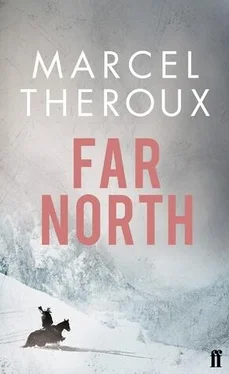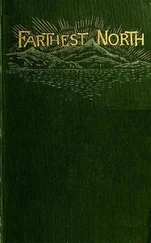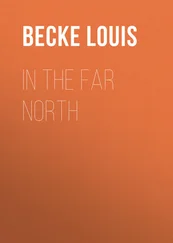At Buktygachak, in the punishment cells, there were patches of writing scraped into the walls: dates, maybe a name, or curses, as if they needed to leave proof that they’d really lived.
I can’t recall that I ever travelled in a bus, but maybe it was fearful. Giving yourself up to it. Something else’s motion. Like me in that lake. What would anyone have found of me?
The road was good. I counted on ten or twelve days for the journey, but I could have halved the time if I pushed it. I was happy with the horses at a walk, covering fifteen or twenty miles a day. Sometimes I would doze as we went, slumped into the saddle, eyes half-shut. In that half-sleep, I’d see visions. It always went back to me as a child. What seems like a good time to you, you figure must be a good time for the world. But in those years that I remember as either lit with sunshine or the comforting crackle of split logs in winter, there were already shadows gathering.
When I was seven years old, I was drinking a soda with my father at the grocery shop that used to belong to Walter Perryman, who came from a very old Quaker family someplace. I look back at it as part of the good times, because I don’t recall going without anything. I remember us as all pretty contented and well fed, and houses still going up, and a general kind of orderliness to things.
It was a hot fly-blown summer day. Walter was wiping down the countertop and chatting to my father. Then they stopped talking and walked together out onto the porch.
I followed them out with my soda, which was in one of those bottles we used to have that close with a glass ball. Walter made different flavours, but the best one was flavoured with birch syrup.
Walter and my father were staring at a wraith, a stick-thin form in rags, in bare feet that were soft and spreading like caribou hooves.
Someone called to her, but she moved like a person in a trance, big glassy eyes unblinking. She must have been walking for weeks. Walter touched her shoulder and she crumpled into a heap at his feet, panting. My father carried her into Walter’s store and lay her on the counter. They propped her head up and tried to get her to eat something. Her head shook, and she pushed them away from her, her skinny shoulders heaving. Then her eyelids fluttered shut and she died right there in front of us.
She was the first. On the outskirts of town, they found her baby. They buried them in the town cemetery, under a plain wooden cross that said: Mother and Son, Known to God. But the ones that came after her were just too many in number to get the same treatment. It wasn’t lack of consideration. Some of the townsfolk who buried them ended up unburied themselves.
*
Snow started coming down towards the end of my first day on the road. I never minded riding through the weather, but the visibility had been cut down to no more than ten yards front and back. I liked to be able to see what was lying in wait for me, so the next chance I got, I ducked off the road to a clearing at one side behind a screen of trees. The snow covered my tracks. And I decided against laying a fire, on account of the smoke. By the time I pitched the tent, I was even too tired to eat, which saved me some food, but I woke in the middle of the night, hungry as a bear, and still dreaming of the smell of frying bacon.
AND FOR TEN DAYS or so that was pretty much the size of it. Ambling along, morning to dusk, keeping my eyes peeled for places to feed and water the animals. As we went, the ice got thicker, until it was no longer enough to give the top of a frozen stream a smart rap with a branch, and I had to dig out a hatchet and chop right through the crust.
Most nights I risked a fire. I hadn’t seen a soul on the road all day, and besides I kept my loaded guns in my lap.
The first clear frosty night I saw the Lights, billowing across the sky like god was shaking out his laundered sheets — if the Almighty sleeps on green gauze. Later in the season, the Lights would have more colours in them, but they looked pretty good to me now. There’s something comforting in movement, and that easy, flowing pattern of lights overhead felt like someone stroking my hair.
About a week in, I shot a moose, and camped for two nights in one place so as to butcher it properly. The skin I had to leave, the offal I don’t care for, but just about everything else I was able to smoke or freeze and carry with me.
I had a strange thought while I was cutting her up, which seemed to come to me out of nowhere. Once in my life, I said to myself, I’d like to taste an orange. That word: orange. It seemed impossibly beautiful. I thought of how an orange sky looked and tried to imagine its flavour: somewhere between caramel and strawberries, I guessed.
Under the Lights, with the planet rocking gently, and a week or so of food curing over the smoke, I felt hopeful that whoever had sent the plane would be waiting for me at the end of the journey. Sometimes I fell asleep and dreamed of arriving somewhere, and being met by a woman something like my mother, who was pleased enough to see me, but a little bit disdainful of my shabby clothes and the food I ate. She’d offer me a basket of oranges in the dream, and with a pleased-with-herself-smile she’d say, We’ve been saving these for you. But however many times I dreamed it, I always woke up just at the moment when I was putting one in my mouth.
*
I got to Esperanza after a couple of weeks. I had the sensation from the road that this wasn’t the place I was looking for, but I rode into her anyway, just to be sure.
It was a copy-cat version of the town I’d left, without a soul in it, never mind someone who could fly a plane. That was the first time since I’d hauled myself out of the water that I felt a glimmer of doubt about what I was doing. It seemed like all that time on hat dangerous road just to get to a place worse than the one I’d come from, and I thought, What if this is all there is between here and Alaska, or beyond?
But the plane I’d seen was real, no doubt of it, and I’d buried her crew and passengers with my own hands. I tried to console myself by asking myself how I’d feel if normal life had been going on here all this time. That would sting, wouldn’t it? Me living like a cockroach in a cellar, and them here with, I don’t know what, schools, and funerals, and Christmas, and oranges.
In the old days I heard there were wars where soldiers disappeared into the forest only to come out decades later and find the fighting had been over for years, and their families enjoying peace and plenty while they’d been drinking water out of tree-stumps and chewing leeches to live.
That thought was a painful one. The idea that I’d just got separated from my proper world, and time was passing, and the other world moving on, and when I found it, I’d be showing up, like a savage in a loincloth, to a city of sparkling glass.
But I think I would have preferred almost anything to the burned-out houses, and trash, and the decay that just told another ten thousand times the story I’d been living in for so long.
And that night when I saw the Lights, they hadn’t a jot of consolation in them. They rolled coldly on overhead, like they will for another million years.
*
That disappointment sobered me a little, but I kept on my way. The days were shortening and getting colder. Beyond Homerton, I knew the laid road ended and it was all ice roads between there and the sea. I had to put on my hunting furs to keep warm — Tungus stuff that I had to battle every summer to keep from becoming moth food: a wolverine jacket, snow-sheep pants and gloves, and soft boots of reindeer skin.
On clear nights, which they mostly were, the snow doubled the moonlight, and I went on, following the glow through the darkness. I tried to be merciful to the horses, but it was a task to keep both fed. They’d both got skinnier, and I knew in the back of my mind that sooner or later I would have to slow up, or get new mounts. There were Yakut ponies out in the bush, but finding them and breaking them might take until spring. It wasn’t so much that I couldn’t afford the time, though that’s what I said to myself, but that the idea of slackening my pace was frightening to me. Forward, forward, said the hooves on the snow. I only wanted to go one way. Behind me, too close for comfort, was that dark shadow in the lake, and the recollection of Ping and her child which I still didn’t have the courage to face.
Читать дальше












